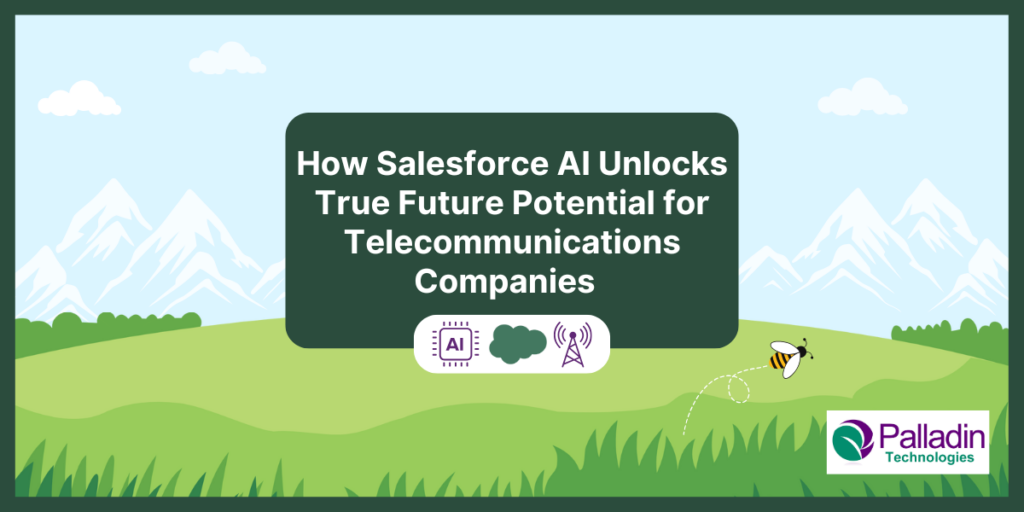The telecommunications industry is at a critical juncture. Faced with an increasingly competitive landscape, shrinking margins, and the demand for seamless subscriber experiences, telcos are under pressure to innovate and transform rapidly. The advent of 5G, IoT, and an explosion of digital services have opened up new opportunities, but they also bring challenges around managing vast amounts of data and delivering personalized, high-quality interactions at scale. To navigate these complexities, telecommunications companies must embrace a data-driven approach to decision-making and subscriber engagement. This is where Salesforce’s AI-powered solutions like Data Cloud and Agentforce can serve as game changers to scaling or established telecommunications organizations.
Salesforce has invested significantly in AI and data capabilities, aiming to empower organizations with the tools they need to thrive in today’s hyper-connected environment. The Salesforce Data Cloud is designed to help businesses unify subscriber data across all touchpoints, creating a single source of truth that enhances decision-making. Meanwhile, Agentforce is revolutionizing how contact centers operate by leveraging AI to streamline interactions, automate routine tasks, and provide agents with actionable insights in real-time.
For telecommunications companies, these AI tools offer a strategic advantage by enabling them to harness the power of their data to drive subscriber satisfaction, operational efficiency, and ARPU. But how exactly can they deliver on these promises?
1. Hyper-Personalized Subscriber Engagement
In the telecommunications industry, churn is a constant concern, with many companies facing annual churn rates as high as 20-30%. Traditional approaches to subscriber retention often fall short because they rely on reactive measures. With Salesforce Data Cloud, telcos can shift from reactive to proactive engagement. By integrating data from billing systems, CRM platforms, social media, and network usage, the Data Cloud creates a comprehensive 360-degree view of each subscriber.
Impact: Imagine a scenario where AI algorithms identify a high-value subscriber who has recently experienced multiple dropped calls. Instead of waiting for the subscriber to complain, the system automatically triggers a personalized outreach campaign, offering compensation or a tailored plan upgrade. This proactive engagement not only reduces churn but also increases subscriber loyalty, directly impacting the bottom line.
2. Optimizing Field Service Operations
Telecom companies manage vast networks of infrastructure that require regular maintenance and timely upgrades. However, managing field service operations can be inefficient, with technicians often sent to the field without real-time data on equipment status or subscriber issues. By leveraging Salesforce Data Cloud and Agentforce, telcos can optimize their field service processes. AI can analyze historical maintenance data, subscriber reports, and IoT sensor inputs to predict potential equipment failures and schedule preventive maintenance.
Impact: For example, a major telco could reduce its operational expenses by using AI to predict outages before they occur. This means fewer emergency repairs, optimized technician schedules, and reduced downtime for subscribers. The result is a more efficient field service operation, lower costs, and enhanced subscriber satisfaction—all critical factors in maintaining competitive differentiation.
3. Enhancing Contact Center or Help Desk Efficiency
In the era of digital transformation, subscribers expect quick and accurate resolutions to their inquiries. Long wait times and inefficient call routing are no longer acceptable. Salesforce’s Agentforce uses natural language processing (NLP) and machine learning to analyze incoming calls, chats, and emails, categorizing them based on urgency and intent. By automating routine inquiries, Agentforce frees up human agents to focus on complex, high-value interactions.
Impact: A telco implementing Agentforce could see a reduction in average handle time (AHT) by up to 20%, significantly lowering operational costs while improving subscriber satisfaction scores. This efficiency translates into millions of dollars in savings for large-scale contact centers, as well as a boost in net promoter scores (NPS), which are critical for subscriber retention and brand reputation.
Telecommunications companies that embrace AI-powered solutions like Salesforce Data Cloud and Agentforce can unlock new levels of agility and efficiency. However, realizing these benefits requires a strategic approach to integration. The journey begins with a clear understanding of business objectives, followed by a phased implementation that focuses on quick wins while building the foundation for long-term transformation.
Key considerations include:
- Data Integration: Ensuring that data from disparate sources is unified and cleansed to create a single source of truth.
- Change Management: Investing in training and change management to ensure that teams can effectively leverage AI tools.
- Scalability: Designing AI initiatives with scalability in mind to accommodate future growth and technological advancements.
In an industry where subscriber loyalty can be fleeting and operational efficiency is paramount, telecommunications companies cannot afford to overlook the potential of AI. By leveraging Salesforce’s Data Cloud and Agentforce, telcos can transform their data into actionable insights, drive personalized subscriber experiences, and optimize their operations at scale. The result is a more resilient, competitive, and customer-centric organization poised for sustained growth in the digital age.
As telcos look to the future, the question is no longer whether to invest in AI, but rather how quickly they can integrate these technologies to stay ahead of the competition. At Palladin Technologies, we specialize in helping telecommunications companies navigate this transformation, leveraging the full potential of Salesforce’s AI capabilities to deliver measurable business outcomes. Let’s unlock your organization’s next phase of growth together.
Learn More About Partnering With Us!
Chief Operating Officer
Ryan Prescott is the Chief Operating Officer at Palladin Technologies, bringing over a decade of experience as a Global Talent Executive. Renowned for leading initiatives in learning and development, HRIS technology, talent development, management, and acquisition, Ryan excels in building cultures of inclusion and equity. A dedicated change management driver and DE&I ally, Ryan has a proven track record of fostering environments that prioritize diversity, equity, and inclusion. His expertise in global people operations, combined with his leadership in talent management and acquisition, has consistently driven organizational success. Ryan’s passion for culture building and his strategic approach make him an invaluable asset to Palladin Technologies, where he continues to lead transformative efforts in market operations.

